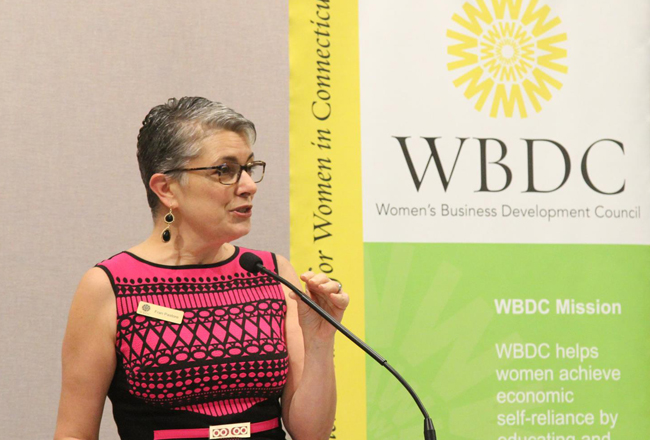Fran Pastore is passionate about the community she represents. And right now, she”™s angry about underrepresentation.

The president and CEO of the Women”™s Business Development Council (WBDC) in Stamford has been hosting frequent webinars and teleconferences for companies struggling to survive the COVID-19 pandemic ”” with a focus on how to go about receiving some of the economic relief money from the Small Business Administration”™s Paycheck Protection Program (PPP).
The problem? “As we are having this interview, I do not know of any WBDC clients, friends or colleagues who have received funding from the Payroll Protection Program,” she said. “I am very concerned about Main Street businesses getting their fair share.
“Many of these businesses are owned and operated by women and minorities and they simply may not have the documentation in place or the resources to assist them in the timely and complex application process,” she continued. “That”™s where WBDC can help. Since the beginning of this pandemic, WBDC”™s Zoom calls, support groups and one-on-one counseling sessions have assisted nearly 2,000 businesses, owned by men and women entrepreneurs, providing information and technical and application assistance to access COVID-19 funds from multiple sources”, Pastore said.
The SBA has shared with the state that millions of dollars have been disbursed in Connecticut, although at press time it was hard to find anyone who had actually received anything.
“We applied for that and for the EIDL (Economic Injury Disaster Loan),” said Ryan Broderick, co-owner of Reverie Brewing Co. in Newtown, “but we haven”™t seen any money yet.”
While Broderick said the applications for those funds were relatively easy, that hasn”™t been the case for everyone. Gisele Tyler, owner of Lash Brow Center in Wilton, said she applied for the PPP on March 30 and the EIDL on April 2. Calls to the SBA, Bank of America, and the fintech that powers her business, Square, revealed a troubling lack of clear direction from the federal government.
Square eventually contacted Tyler by email on April 12 to tell her it was processing her PPP payment ”” which still has not arrived.
“It is apparent that this is not a ”˜first come, first served process,” she said. “There is some selection going on and I”™m wondering if certain industries are being pushed to the side of the pile.
“It baffles me that there is such a lack of communication coming out of these agencies ”” SBA, IRS, etc.,” Tyler continued. “I think a simple email follow-up would go a long way to assuage the growing fears of the people.
“I am afraid that our industry will be amongst the last to reopen, and rightfully so,” she said. “But I”™d like to have an idea so that I can realign my staff”™s expectations.”
“POSTER CHILD FOR INCOMPETENCY”
Patricia Fisher, president of Stamford-based IT security and consulting firm Janus Associates, said she”™d been sparring with Chase ”” her bank of choice for over 25 years ”” over her firm”™s PPP loan practically since the program was announced.
“They”™re probably the poster child for incompetency as far as getting this program out,” she said. “It”™s been exceedingly frustrating. They weren”™t even communicating with us until I just pushed myself on them.”
Fisher said she”™s remained in contact with about 40 fellow entrepreneurs in the tristate area who attended Goldman Sachs”™ “10,000 Small Businesses” program, designed to help business leaders create jobs and economic opportunities, a few years ago.
“One of them got the money, and said she had a very good experience with a smaller bank,” she said. “But anyone who dealt with a large bank had gotten no communication until last week ”” when they got an email telling them the (PPP) funds were exhausted.”
Janus also applied for an EIDL loan on the first day they were offered, she added, “but we”™ve never heard another word about it. I have no idea where that (paperwork) went.”


Robin Imbrogno, founder, president and CEO of The Human Resource Consulting Group (HRCG) ”” which provides HR, payroll and benefits services around the state ”” said that a number of her clients have received payments, as has HRCG itself.
However, she said, “There are still a lot of unknowns, including over loan forgiveness, which has created a huge amount of trepidation when it comes to making loans to people you don”™t know very well.”
In fact, Imbrogno said, “It seemed like you needed the right connections with the banks, at least in the initial phase. If you had a long-term relationship with a bank, they felt more comfortable working with you.”
Not that every bank has fumbled the ball. M&T, based in Buffalo and with numerous branches in both Connecticut and New York, has had $6.4 billion in PPP funding approved for 27,711 businesses employing more than 600,000 people, successfully processing more than 96% of the qualified applications it received, according to Vice President David Samberg.
“Last year M&T approved 1,449 SBA loans,” he said. “We just did more than 27,000 in a week.”
In the Connecticut/Westchester/Rockland region, Samberg said, the bank got approval for 820 loans totaling $282 million.
KeyBank, headquartered in Cleveland, said that, through April 15, it had successfully processed approximately 35,000 SBA applications from clients requesting $8.5 billion in funds from the PPP.
NEED FOR CLARITY, GUIDANCE
Still, those appear to be the exceptions, not the rule. On April 16, Imbrogno, who is also president of The Payroll Group ”” the nation”™s largest association of independent payroll processing and human resources professionals ”” sent a letter to U.S. Treasury Secretary Steve Mnuchin and SBA Administrator Jovita Carranza seeking clarification and guidance on three issues:
Calculation of full time employee (FTE), of which her letter said, “Companies fear that they will lose the forgiveness provisions after 6/30/20 based on honest mistakes in developing the FTE count. ”¦Potential mistakes in calculations of FTE counts by the borrower at the beginning of the process should not preclude 100 percent forgiveness of payroll costs at the end of the program.”
Clarity to borrowers that the eight-week period for payroll coverage can start any time before June 30. The overwhelming demand for access to the PPP funds “has created potential delays as to when the loans themselves will be finalized, and when funding is given,” she wrote. “Borrowers who get a loan finalized in late May or early June believe they will be unable to take advantage of the PPP”™s full repayment provision because of the June 30th expiration date.”
Consistency around forgiveness. “Many of our members are working with businesses that are hesitant to take out a PPP loan because of uncertainty about what banks will require to certify qualification for the PPP”™s forgiveness provisions,” Imbrogno wrote. “We urge you to release details as soon as possible on what type of documentation banks will need in order to forgive the loan after June 30th. This should include clear direction on rent/mortgage payments, utilities, healthcare and other bills that employers have covered during this period.”
There is also uncertainty and red tape ”” or in some cases, the sudden lack of it ”” to get through.
“Everything is shut down from town halls to state agencies,” NFIB Connecticut State Director Andrew Markowski said. “Licenses, permits ”” the regular paperwork that goes on can be hard to get processed when certain departments are closed or have had staff reductions.”
With new legislation and proposals being made seemingly every day, Markowski said, “Small business owners are trying to keep track of it all. Most of them don”™t have a lawyer, a CPA or even HR on staff. They”™re left to figure it out on their own.
“Small-business owners here tell me they are struggling daily to keep the doors open while spending hours trying to understand the complexities of loans that have been offered to be sure they are making good financial decisions,” he added. “They appreciate the support and only hope it won”™t be too long before they can bring employees back on the job and get back to business.”
The NFIB Research Center reported that nearly 66% of respondents to its recent survey of 884 small businesses said they had successfully submitted PPP applications, but that none had received EIDL emergency grants.
The group”™s research “indicates that half of all small businesses cannot last more than one to two months under current conditions,” NFIB President Brad Close said. “Banks and other financial institutions need to do everything in their power to get these loans out the door to Main Street businesses now, whether or not the small business is an existing customer, or a new customer.
“The current delays are unacceptable, and hurt those that need the help most ”” very small businesses that find themselves in the worst of financial circumstances,” Close said.
The NFIB is hopeful that Congress”™ funneling of another $370 billion into the PPP will have better results.
On April 21, the U.S. Senate approved $484 billion in new coronavirus aid for small businesses and hospitals, which also includes more funding for testing. The House was expected to vote on the bill on April 23.
“It is crucial (Congress does) it in a manner that truly aids the smaller firms in this country,” Close said. “These are the ones that faced the most challenges accessing PPP and disaster loans ”” something we can”™t afford to let happen again.”
IMPACT ON MWBES
As head of the WBDC in Connecticut, Pastore”™s mission is to help women- and minority-owned businesses thrive. But indications are that those types of businesses may be most at risk during the pandemic.
According to The Brookings Institution, people of color represent about 40% of the population, but only 20% of the nation”™s 5.6 million business owners with employees, while women make up 51% of the U.S. population but only 33% of business owners with employees.
The PPP “favors existing customers at large banks and may be less relevant to underbanked and unbanked MWBEs (minority- and women-owned business enterprises),” according to a recent Brookings report. “Large banks approve about 60% of loans sought by white small business owners, 50% of loans sought by Latino or Hispanic small business owners, and 29% of loans sought by Black small business owners, according to 2018 data from the Small Business Credit Survey.”
Noting that MWBEs played a significant role in helping the country rebound from the 2008-09 economic crash, Brookings added: “As in the aftermath of the Great Recession, the resilience of MWBEs will be fundamental to the nation”™s economic recovery, so it is critical for policymakers to maintain their commitments to building more inclusive local economies.”
“My concern is for Main Street America,” Pastore said. “This is going to change the culture and the face of American life.”
“Right now I”™ve been able to hold on to all of my people,” Janus”™ Fisher said of her staff of 14. “I built up a little cushion beforehand to be able to do that. And we”™ve been working with our clients to keep our projects going.
“But it still looks pretty shaky for the future,” she added. “That”™s what gives me nightmares.”


















